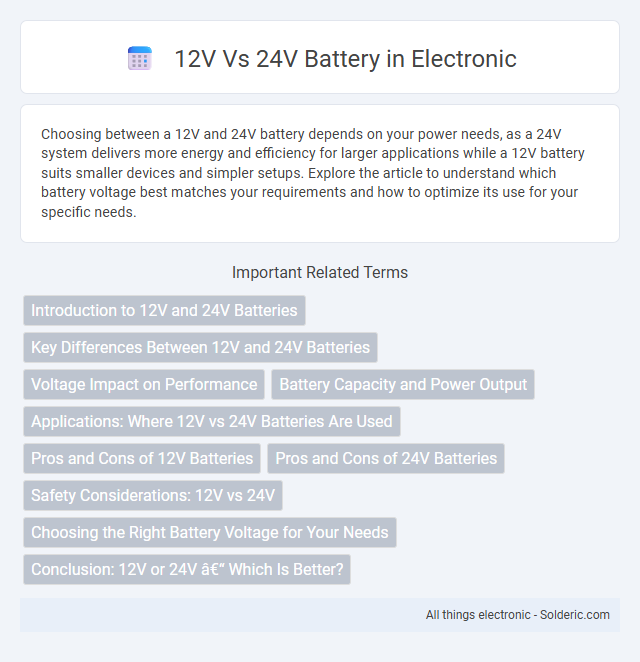Choosing between a 12V and 24V battery depends on your power needs, as a 24V system delivers more energy and efficiency for larger applications while a 12V battery suits smaller devices and simpler setups. Explore the article to understand which battery voltage best matches your requirements and how to optimize its use for your specific needs.
Comparison Table
| Feature | 12V Battery | 24V Battery |
|---|---|---|
| Voltage | 12 Volts | 24 Volts |
| Common Uses | Cars, small boats, motorcycles | Heavy vehicles, industrial equipment, larger boats |
| Power Output | Lower power, suitable for lighter loads | Higher power, ideal for demanding applications |
| Size & Weight | Smaller, lighter | Larger, heavier |
| Cost | Generally less expensive | Typically more expensive |
| Charging Time | Shorter due to lower voltage | Longer, requires compatible charger |
| Battery Life | Standard lifespan | Often longer lifespan under similar conditions |
| Compatibility | Compatible with most consumer vehicles | Requires specific 24V systems |
Introduction to 12V and 24V Batteries
12V and 24V batteries are widely used in various applications, with 12V batteries commonly powering automotive and small-scale systems, while 24V batteries are often preferred for larger or industrial setups requiring higher voltage. The 12V battery delivers lower voltage but allows for simpler wiring and compatibility with most consumer electronics, whereas the 24V battery provides increased power output and efficiency for heavy-duty equipment and electric vehicles. Understanding the voltage differences and use cases is essential when selecting the appropriate battery system for specific energy needs.
Key Differences Between 12V and 24V Batteries
12V batteries typically provide lower voltage suitable for small to medium power applications, while 24V batteries deliver higher voltage ideal for heavier loads and longer cable runs with reduced energy loss. Your choice between 12V and 24V batteries affects system efficiency, wiring requirements, and overall power output, with 24V systems generally offering improved performance for larger electrical setups. Voltage compatibility with your equipment and the specific energy demands are critical factors when deciding between 12V and 24V battery configurations.
Voltage Impact on Performance
A 24V battery system delivers higher voltage, which translates to increased power output and efficiency compared to a 12V system, especially in high-demand applications like electric vehicles and solar setups. Higher voltage reduces current flow for the same power level, minimizing energy loss due to resistance and improving overall system longevity. Your choice between 12V and 24V batteries significantly impacts device performance, energy consumption, and system design complexity.
Battery Capacity and Power Output
A 24V battery system typically delivers higher power output and greater capacity compared to a 12V battery, making it ideal for applications requiring more energy and longer runtimes. Your choice affects the efficiency and performance of devices, with 24V systems often enabling smaller gauge wiring and improved energy transfer. Understanding the capacity differences helps optimize energy storage and ensures your setup meets the power demands effectively.
Applications: Where 12V vs 24V Batteries Are Used
12V batteries are predominantly used in automotive applications, including cars, motorcycles, and small boats, due to their compatibility with most vehicle electrical systems and accessories. In contrast, 24V batteries are favored in heavy-duty equipment, trucks, and industrial machinery where higher voltage supports more powerful engines and extended operational capacity. Renewable energy systems and electric vehicles also utilize 24V batteries to optimize energy efficiency and support larger power demands.
Pros and Cons of 12V Batteries
12V batteries offer advantages such as easier availability, lower initial cost, and compatibility with most automotive and small-scale applications. They are lighter and simpler to maintain but provide less power and shorter operational time compared to 24V batteries, which can limit their use in high-demand scenarios. Your choice should consider the specific power requirements and weight constraints of your application to determine if a 12V battery meets your needs efficiently.
Pros and Cons of 24V Batteries
24V batteries offer higher power output and efficiency, making them ideal for heavy-duty applications and longer run times compared to 12V batteries. They enable smaller, lighter wiring and reduced current flow, but may require specialized chargers and maintenance, increasing overall system complexity. Your choice depends on the specific energy demands and compatibility with existing equipment.
Safety Considerations: 12V vs 24V
12V batteries are generally safer to handle due to their lower voltage, reducing the risk of electrical shock and making them suitable for residential and small-scale applications. In contrast, 24V batteries offer higher power output but pose a greater risk of electrical hazards, requiring enhanced insulation and protective measures during installation and maintenance. Proper safety protocols, including using appropriate fuses and circuit breakers, are essential when working with both 12V and 24V battery systems to prevent short circuits and fire hazards.
Choosing the Right Battery Voltage for Your Needs
Selecting between a 12V and 24V battery depends on the specific power requirements and application type; 12V batteries are ideal for smaller vehicles and basic electronics, delivering sufficient power with easier availability and lower cost. For high-demand equipment like larger vehicles, solar systems, or industrial machinery, 24V batteries provide greater energy efficiency, faster charging, and reduced current draw, enhancing overall performance and lifespan. Evaluating voltage compatibility, load demands, and energy storage needs ensures optimal battery selection tailored to operational efficiency and cost-effectiveness.
Conclusion: 12V or 24V – Which Is Better?
Choosing between a 12V and 24V battery depends on your specific power needs and application. A 12V battery is ideal for smaller systems with moderate power demands, offering compatibility and easy availability, while a 24V battery provides higher power efficiency and is better suited for larger or more energy-intensive setups. Your decision should consider factors like system voltage requirements, energy consumption, and overall efficiency to determine which battery voltage best supports your performance goals.
12V vs 24V battery Infographic

 solderic.com
solderic.com